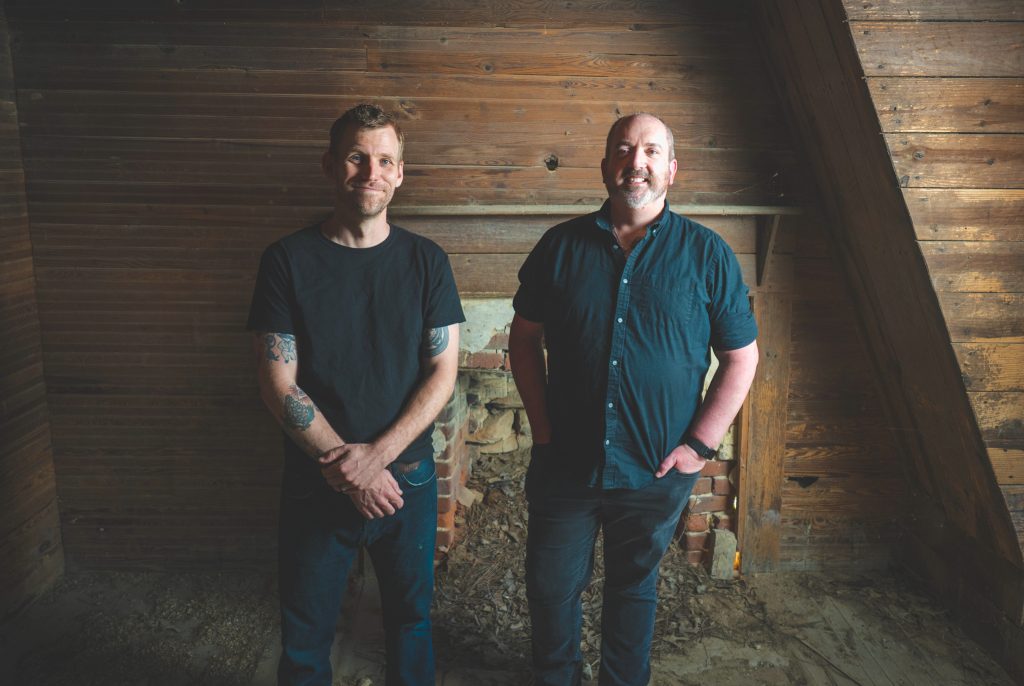Cybersecurity podcast Data@Rest released its fifth season on May 13. It is available on podcast apps such as Spotify and Apple Podcasts, as well as the web.
The Information Security Office launched Data@Rest in 2019 as a collaboration between Michael Williams, Network Team Lead, and Charlie Mewshaw, who is now Chief Information Security Officer at UNC Fayetteville State University after years with ITS. Mewshaw and Williams plan to continue the podcast as a joint effort between the two universities.

Protecting the audience
Season five of the show includes information on a variety of topics, such as blockchain and election security, as well as refreshers and updates on cybersecurity best practices. Mewshaw and Williams chose topics for the season based on what they were seeing in mainstream news and online conversations.
Mewshaw and Williams aim to share information that protects people as a method of risk reduction. Their approach is to make information accessible to those outside of the information security profession.
“If we only focused on listeners who already work in security, we might never take time to talk about the more human side of our topics such as the histories of various technologies or how they’ve been implemented,” said Williams. “We always find that stuff fascinating.”
Engaging and explanatory
The two hosts have different experience and areas of expertise within information security. Williams said that this enables them to strike a balance between confidently engaging with their professional audience and making space in the conversation for anyone without the knowledge or experience by explaining things to one another.
Season five included one guest, Jared Perdue, Information Security Specialist with the Information Security Office. Williams called Perdue an ideal guest due to his “deep technical expertise” and abilities as a “fun and engaging conversationalist.” Perdue’s episode centered around an article that he wrote for ITS News about mobile security; it is one of many sources used on the show that balances the hosts’ ideals of sharing verified, legitimate information and not selling their audience on anything.
Mark Ingram, Infrastructure and Technical Support Manager for the Office of University Development, is an avid listener of the podcast. “It’s such a great way to consume IT security related information for someone like myself that has limited bandwidth for reading,” he said. The hosts’ “lighthearted banter and witty commentary make learning about what could otherwise be a dry subject much more palatable. I consider it a valuable professional resource and the fact that it’s recorded makes it easy to fit it into my schedule and re-listen to certain segments to refresh my memory.”
Q&A with Michael Williams
What can listeners expect from season five of Data@Rest?
This season is a little more trimmed down, a little more focused. We set a slate of topics with direct relevance to information security, discussed their history, discussed their current status, and talked a little about the future of things. We didn’t really have time to experiment that way we had in previous seasons, but that lent our efforts much greater focus.
Your audience is broad; how does having such a variety of listeners inform the topics you choose for each episode?
We both care a great deal about effective outreach, and we both know reaching people and encouraging them to be more aware of security is the most effective and most meaningful method of risk reduction. I can throw firewalls at a problem all day, but ultimately what we’re trying to protect are people, so sharing information with people should always be a high priority.
Are the humor and anecdotes that you incorporate intentional for the listeners or are they natural aspects of the conversations you’re having? Or both? Definitely both. Charlie and I are friends, so we’re comfortable cracking jokes and sharing personal anecdotes, and we’re friends who originally met through work, so we naturally incorporate professional topics into that friendship and conversation. That said, there have absolutely been times when we’ve been mid-conversation and said, “Wait, let me rethink how to say this so it’s more comprehensible to someone who doesn’t do this every day.” How do you feel that your personal interests also inform what you discuss during the episodes? The ultimate goal of information security is to make people safer. Information security only works when it considers people to be the point. And to do that, we have to consider the whole person, not just the fraction of them that sits at a keyboard for part of the day or that logs into ConnectCarolina or sends an email. Everything in that person’s life influences their actions and choices at all times in their life, so we have to take that into consideration as well. Casey Kibe, who expects to graduate in May 2023 with a degree in Management and Society, edited seasons 3, 4 and parts of 5 as a student worker with the Information Security Office. Michael Williams wanted to recognize Kibe for her contributions to the podcast as audio producer. She’s worked incredibly hard and has been a real pleasure to work with, Williams said. Also, being ourselves and showing a little of our own humanity makes listeners much more likely to listen to what we have to say. People want connection. They want to feel their own humanity is validated by seeing it reflected in the humanity of others. That desire for connection might even draw people to listen who otherwise would never subscribe to a computer security podcast. We could have produced a series of pamphlets in much less time, I’m sure, but would the same set of people read them as listen to the show? There might be some overlap, sure, but some portion of our listenership would never have read that pamphlet. And plenty of people are already out there making pamphlets.
Student Worker Shoutout

